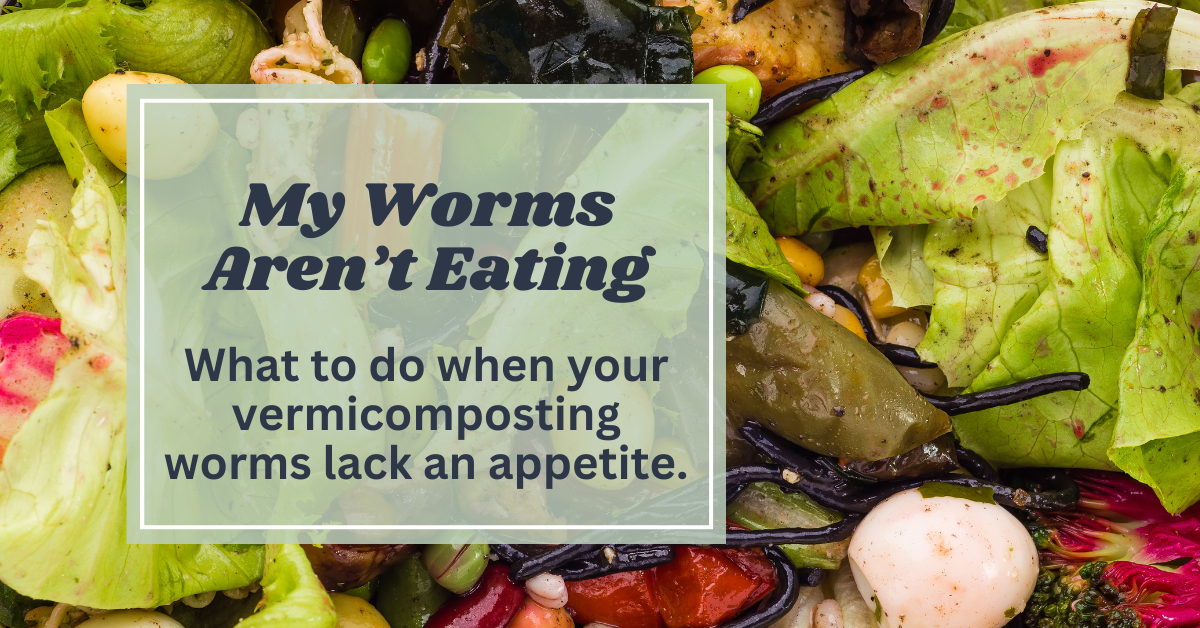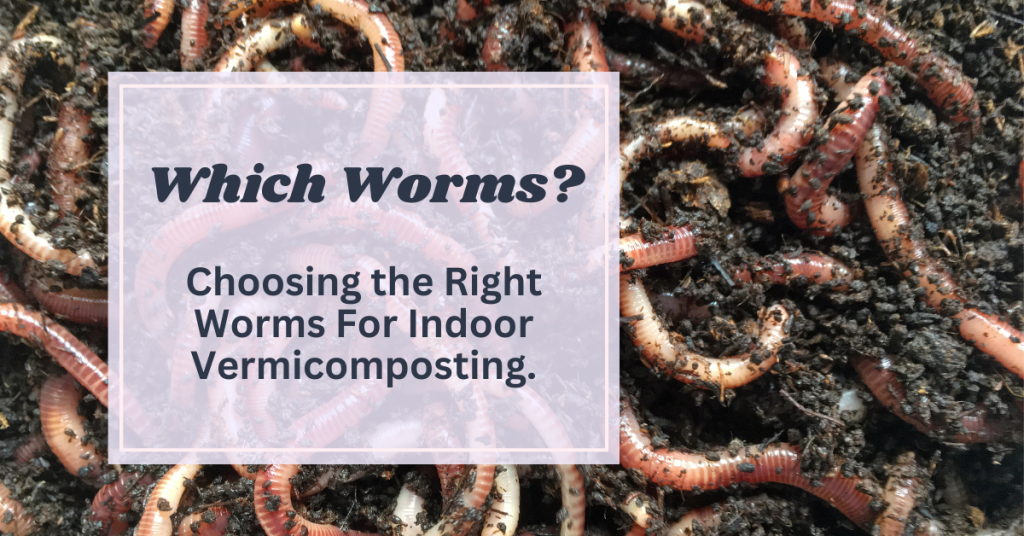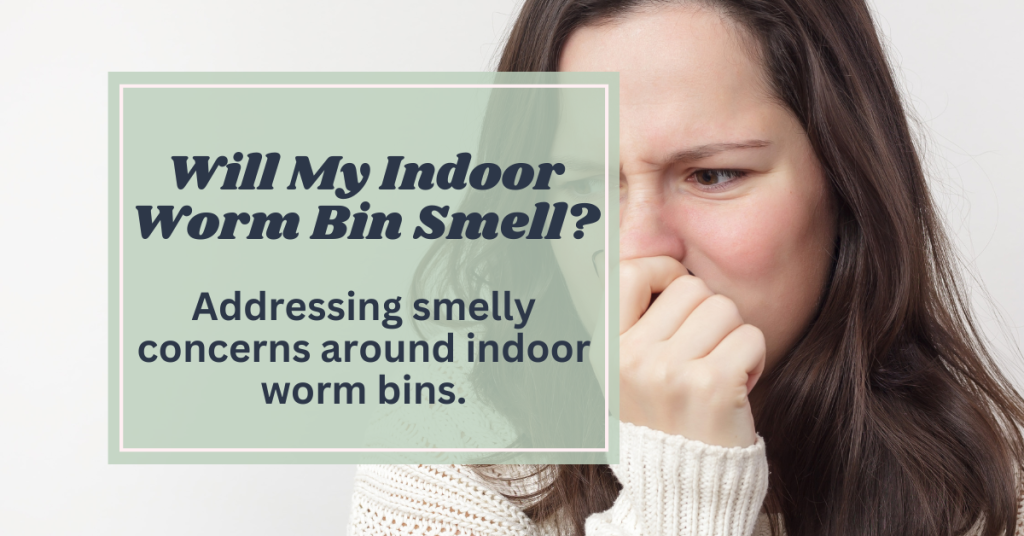My Worms Aren’t Eating: What to Do When Your Vermicomposting Worms Lack An Appetite
Please note that this post may contain affiliate links, which means we may earn a commission if you make a purchase through our links, at no extra cost to you. Learn more.
One of the most common concerns for new vermicomposters is when it seems like their worms aren’t eating or that composting is happening too slowly.
It’s important to remember that worms don’t actually eat food scraps directly.
Instead, they feed on the microbes that break down the organic matter.
If food scraps are fresh or bin conditions aren’t ideal, this process can slow down, making it seem like the worms aren’t eating.
In this post, we’ll explore some reasons why your worms may not be as active as you’d expect and offer tips to get them back on track.
Understanding the Worm Feeding Process in Vermicomposting
Worms don’t munch on food scraps the way we might think.
Instead, they rely on microbes—bacteria and fungi—that naturally break down the organic material in the bin.
When you place food scraps into your worm bin, the decomposition process begins, and the worms feed on these microbes as they colonize the decomposing food.
This means that if the food hasn’t started breaking down yet, your worms may not be interested in it.
Several factors, like moisture, temperature, and ventilation, influence how quickly food breaks down and how fast worms can start “eating.”
It’s important to give food scraps enough time to decompose and create the microbial activity that worms need to thrive.
Common Reasons Your Worms Aren’t Feeding Properly
If your worms seem uninterested in the food or composting is slow, there are a few common reasons to consider:
Food Type: Worms aren’t fans of all food scraps. Items that are too acidic, oily, or spicy, like citrus peels, dairy, or meat, can slow down their activity. Stick to softer, plant-based scraps like vegetable peels, fruit, and grains for better results.
Food Freshness: Fresh food scraps may take time to break down, which means fewer microbes for worms to feed on right away. Worms tend to prefer food that has begun to decompose slightly, so overly fresh scraps might be ignored.
Bin Conditions: The conditions inside the bin are critical for decomposition. If the bin is too dry or too wet, too hot or too cold, microbial activity slows down, which in turn delays worm feeding.
Overfeeding: Adding too much food can overwhelm the bin, making it harder for the microbes to break down all the scraps. This slows the whole process, leaving worms with less decomposed material to consume.
How to Troubleshoot Slow Composting
If your worms aren’t feeding as expected, here are some steps you can take to speed up the composting process and keep your bin running smoothly:
Adjusting Food Types: Stick to worm-friendly scraps like vegetable peels, non-citrus fruits, and grains. Avoid foods that are too acidic, oily, or processed. This will ensure that decomposition happens at a steady pace.
Pre-composting or Freezing Scraps: To help food break down faster, try pre-composting (letting it sit outside the bin to start decomposing) or freezing it before adding it to the bin. Freezing breaks down cell walls, making it easier for microbes to do their job once the food is thawed and added to the bin.
Check Moisture Levels: Worms and microbes thrive in moist conditions. If the bin is too dry, decomposition slows down, and the worms won’t have enough microbes to feed on. Mist the bin if needed to maintain damp, but not soggy, bedding.
Maintain Ideal Temperatures: Worms are most active in temperatures between 55°F and 77°F (13°C and 25°C). Keep your bin in a stable environment to avoid extremes that could slow down microbial activity.
Stir the Bedding: Gently turning or stirring the bedding increases oxygen flow, which helps microbes break down food faster. Just be careful not to disturb the worms too much in the process.
Signs of Healthy Worm Activity in Your Bin
To ensure that your worms are feeding properly and the composting process is on track, keep an eye out for these signs of healthy worm activity:
Casting Production: One of the clearest signs that worms are feeding well is the presence of castings—those small, dark, crumbly particles left behind after digestion. If you see plenty of castings in the bin, it means your worms are doing their job.
Active Movement: Healthy worms should be active, moving around the bin and burrowing through the bedding. If they’re sluggish or huddling in one area, it could be a sign of poor bin conditions.
Decomposing Food: Over time, you should notice that food scraps in the bin are breaking down into smaller pieces. If the food is still sitting there whole after a week or two, it’s a sign something may be off.
By regularly monitoring these signs, you can adjust your bin’s conditions as needed to keep the composting process efficient.
Key Takeaways
- Worms don’t eat food scraps directly; they feed on the microbes that break down organic material.
- Slow composting can result from factors like overfeeding, improper food types, or poor bin conditions such as moisture or temperature imbalances.
- Troubleshooting techniques include adjusting food types, pre-composting or freezing scraps, maintaining proper moisture levels, and keeping the bin at an ideal temperature range.
- Signs of healthy worm activity include the production of castings, active movement, and gradual decomposition of food scraps.
By staying aware of these factors, you can ensure that your indoor vermicomposting bin stays healthy, productive, and odor-free.









